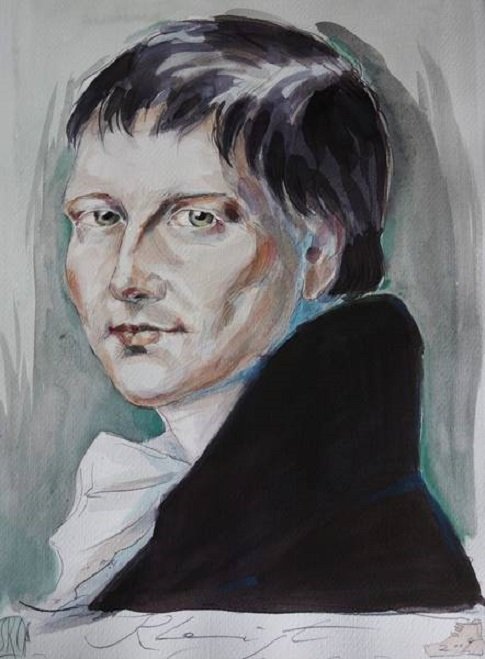Live and creativity of Heinrich Wilhelm von Kleist
Heinrich Wilhelm von Kleist comes from the old German aristocracy, in which the centuries-old warrior traditions are vigorously guarded. In the spirit of his established family tradition, he prepares for a career in the Prussian army, but in 1797 he suddenly gives up his soldier life, begins to read diligently, confidently enters the literature, takes on the publication in Berlin of two consecutive literary magazines / initially publishes "Feb", and later "Berlin and Evening Journal", which fails to impose in the literary life of the Prussian capital.
By tradition, which is established in Germany during the Age of Enlightenment among the German intelligentsia, Kleist is engaged in his own education. He believes in the possibilities of reason and the susceptibility of man to self-improvement. The reading of Kant's works casts him in despair. By interpreting Kant's criticism in his own way, he finds the failure of human cognitive ability, the inability to attain the truth and impenetrability of the world around us. Kleist chooses the wandering, physically and spiritually, falls into deep psychic crises, is often struck by the attacks of physical exhaustion. Although he is disgusted with the clerical career, due to the need for funds, he changes various administrative posts in Berlin (1804) and Königsberg (1805-1806), but he remains convinced that the only worthy intellectual vocation is literature. The defeat of the Prussian army at Jena brought new turbulence in his life, and again, failures were made. Then Kleist decided to move from Königsberg to Dresden, a city with a lively intellectual life where he hopes to carry out some of his literary projects. In 1808, he began to publish with the philosopher Adam Müller "The Art Magazine" "FeB", but this endeavor soon failed. The uprising that broke out in Austria against Napoleon's tyranny fills him with hopes, and he has entered the political struggle.
At that time, he composed the drama "The Battle of Armini", sparking a wicked spirit and hatred, Kleist's only creative failure as a playwright. The crash of the uprising in Austria exhausted his patriotic enthusiasm and failed his grandiose projects in the field of politics. In 1809, Kleist settled in Berlin, joined Arminim, Brentano and Fouke, who were trying to revive the German patriotic spirit and prepare the people for a national liberation war. The following year, he began publishing the Berlin Evening Journal, which is short, because his publisher has been harrassed by censorship, and is generally skeptical of the Berlin youth. Caught by deep despair, overwhelmed by the suppression that he has failed in all his life endeavors Kleist committed suicide in 1811. Hated by Goethe, who is annoyed by his works, Kleist dies misunderstood and unrecognizable. It will take a century to be accepted by literary critics and historians among the great family of the great German writers.

Good crafting you've got here of Heinrich Wilhelm, the Philosopher @godflesh
This account of his life exemplifies the typical nature of man whose first aim is to find SECURITY in Conquest of his Immaginary or Real Enemies either by BRUTE as in armoured Warfare or in INTELLETUAL Warfare, which he chose!!
Happy Sunday!!
this is a great article
Posted using Partiko iOS